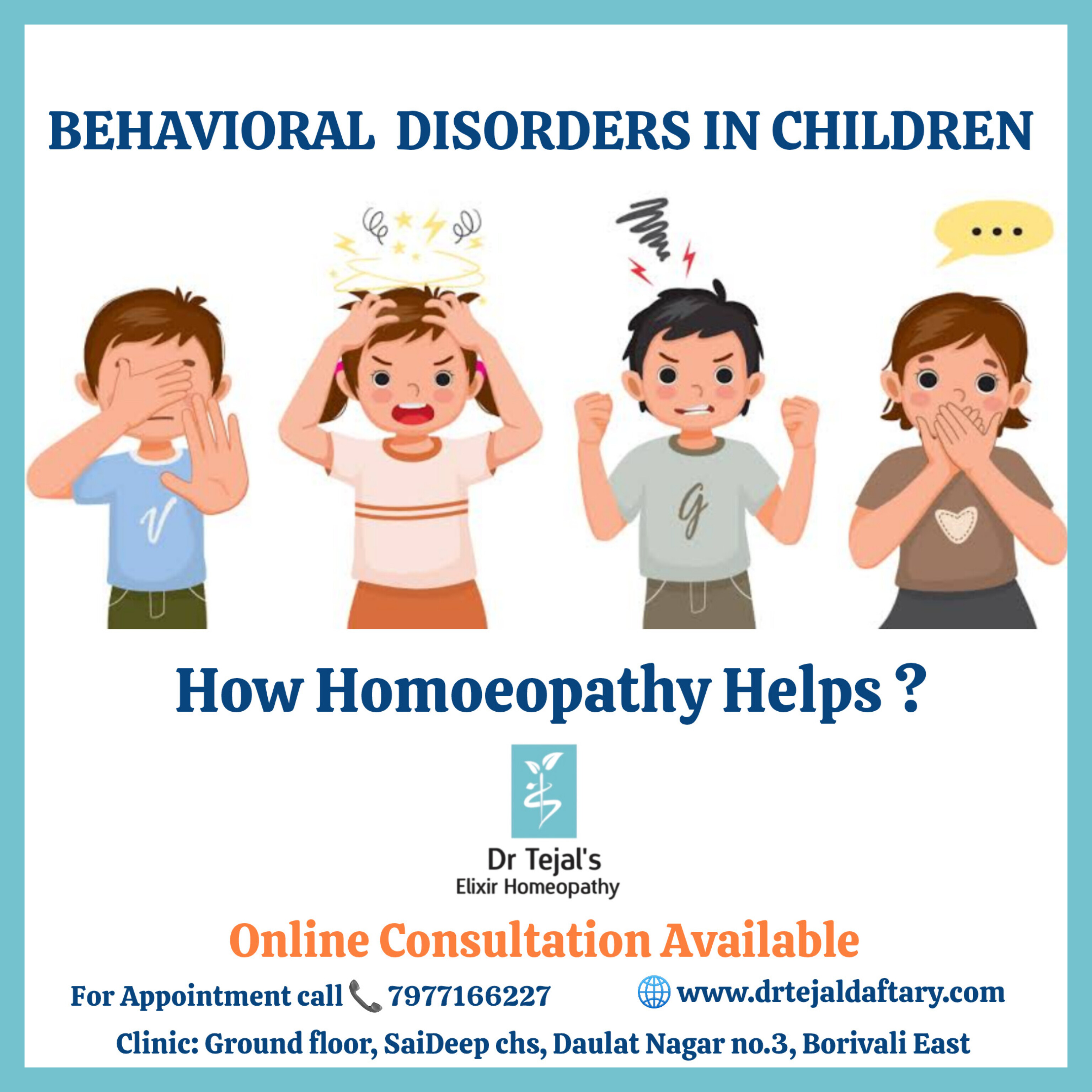
Post by Dr.Tejal DAftary, Aug 23, 2024.
BEHAVIORAL DISORDERS IN CHILDREN
BEHAVIORAL DISORDERS IN CHILDREN Every child has their unique patterns of growth and maturity with makes it difficult to set a standard which can be called as ‘normal’ growth and development. All kids misbehave some times and have temporary behaviour problems due to stress like birth of a sibling, divorce or death in the family to name a few. Behaviour disorders are more serious and long standing. Let’s say they involve a pattern of hostile, aggressive, or disruptive behaviours inappropriate for the child’s age for more than 6 months.
Acts to look out for include:
- Harming self or threatening other people or pets
- Damaging or destroying things
- Lying or stealing
- Falling performances at school, skipping school
- Early smoking, drinking or drug use
- Early sexual activity
- Frequent tantrums and arguments
- Consistent hostility towards authority figures
CAUSES :
- Internal (physical, biological) factors-genetics, chemical imbalances in the body, and damage to the central nervous system, such as a head injury.
- Environmental factors – exposure to violence, extreme stress, or loss of loved one
- Combination of the two.
Some commonly acknowledged disorders of childhood are:-
Anxiety Disorders
Young people, who experience excessive fear, worry, or uneasiness may have an anxiety disorder. Anxiety disorders are among the most common of childhood disorders This disorders include:
- Phobias, which are unrealistic and overwhelming fears of objects or situations.
- Generalized anxiety disorder, where children show a pattern of excessive, unrealistic worry that cannot be attributed to any recent experience.
- Panic disorder- “panic attacks” with rapid heartbeat and dizziness.
- Obsessive-compulsive disorder
- Post-traumatic stress disorder-flashbacks and other symptoms in children who have experienced a psychologically distressing event, such as abuse, being a victim or witness of violence, or exposure to other types of trauma such as wars or natural disasters.
Depression
Many people once believed that severe depression did not occur in childhood. Studies show that two of every 100 children may have major depression.
Child exhibits change at the following levels-
- Emotions—Children often feel sad, cry, or feel worthless.
- Motivation—Children lose interest in play activities, or schoolwork declines.
- Physical well-being—Children may experience changes in appetite or sleeping patterns and may have vague physical complaints.
- Thoughts—Children believe they are ugly, unable to do anything right, or that the world or life is hopeless.
Bipolar mood Disorder
- Children and adolescents who demonstrate exaggerated mood swings that range from extreme highs (excited or manic phases) to extreme lows (depression) may have bipolar mood disorder ( manic depression). Periods of moderate mood occur in between the extreme highs and lows.
Autistic disorder
- Children with autism, have problems interacting and communicating with others. Signs of autism can be picked up by the 3rd birthday, children appear to act inappropriately, often repeated behaviours over long periods of time.
- Symptoms of autism range from mild to severe. Children with autism may have a very limited awareness of others and are at increased risk for other mental disorders. Studies suggest that autism affects 10 to 12 of every 10,000 children. When the hostile behaviour persists and becomes trouble creator at home or school or with other kids in the neighbourhood, the child is said to be having a Disruptive behaviour disorder. Disruptive behaviour disorders are of two types:
- Oppositional Defiant Disorder (ODD) :
A child who has a lot of temper tantrums, is disobedient or argues with adults or friends persistently may have Oppositional Defiant Disorder.
- Conduct Disorder (CD)
More serious problems like frequent physical aggression, stealing or bullying may be a sign of Conduct Disorder . They may think that other people are being mean to them or intend to harm them, they always feel threatened and suspicious
Their language skills and hence communication skills may be impaired, would not be able to socialise,make friends and end up feeling sad, frustrated, and angry.
ADHD- Attention-deficit Hyperactivity Disorder
- Young people with attention-deficit hyperactivity disorder are unable to focus their attention and are often impulsive and easily distracted. Another way of explaining this disorder is that the child feels neglected and puts up a highly active behaviour, a disturbing level of activity in order to seek attention.
- ADHD occurs in up to 5 out of every 100 children. Most children with this disorder have great difficulty remaining still, taking turns, and keeping quiet. Symptoms must be evident in at least two settings, such as home and school, for making this diagnosis.
Learning Disorders
- Difficulty in receiving or expressing information could be a sign of learning disorders. Learning disorders can show up as problems with spoken and written language, coordination, attention, or self-control.
- Kids who have behaviour problems are at higher risk for school failure, mental health problems, and even suicide. Classes or family therapy may help parents learn to set and enforce limits. Talk therapy and behaviour therapy for your child can also help.
PROBLEM RESOLUTION MANAGEMENT
Conservative Management
Oftentimes a disturbed behaviour can be dealt with just by changing the way of dealing with the child, after analysis what exactly has triggered the child’s problem, for example a child disturbed due to a new sibling being added to the family can be dealt in a more sensitive and careful way by the parents, keeping in mind the child does not feel neglected again. Other times with some level of professional psychologist and behavioural therapy also the case can be managed. In both the situations the homeopath aims at discussing the child’s problem and its origin with the parents so that they know best what can be changed in the child’s environment so as to help it get over the stress.
Homeopathic Therapeutic Management
Homeopathic prescribing is not based on the disease name instead it depends on the kind of individual who is afflicted by any disease. This requires the physician to analyse and decide which constitution type the patient belongs to and then a similar constitutional remedy is prescribed
Homeopathic care is a great benefit for the healthy development of children as it deals with the entire pattern of physical, emotional, and mental characteristics of children – basic constitution. The primary reason to find out the child’s constitution is
- It will tell you what your child’s susceptibilities are.
- It can show you what stresses are most likely to bring about illness. Avoiding these stresses comprises what we term “primary prevention” in health care.
- Homeopathic case taking involves details of the patient covering their present illness, past illness ,familial illnesses, the physical attributes and habits, their life events and their living environment ,influences of all things and people in their environment.
- Similarly in case of these developmental disorders of the child a thorough detail about the child’s daily routine, every habit and behaviour ,every act, like ,dislike, details of the persons around the child the environment and the surrounding that the child is exposed to, relationships of people around the child .every such detail is elicited from the child’s parent/guardian in order to get a complete picture of how the child has been brought up ,how it is developing and this in turn give a glimpse into the various loopholes which would have created the disharmony in the child’s development leading to the disorder, presenting to us as an “abnormal behaviour”.
- Studies have shown that the way a child develops, is also affected by its antenatal environment, which means the period when it was in the womb, all the various types of stresses the mother would have gone through has a bearing on the child’s behaviour, a concise explanation of this is every depressive episode produces certain hormones in the mother’s body which in turn reaches the foetus blood and creates the same hormonal effect on the foetus, eventually on the child if exposed for quite a duration. Hence we see the importance of eliciting the details of the pregnancy.
